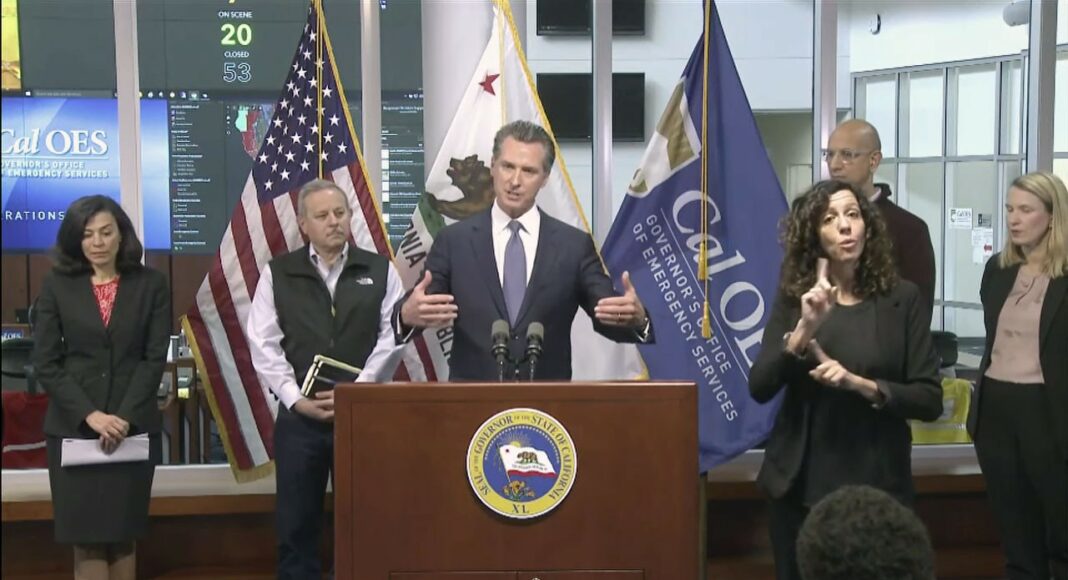On Friday afternoon, Gov. Gavin Newsom signed an executive order temporarily delaying evictions directly tied to the coronavirus.
SUNDAY, 1PM UPDATE: Tenants advocacy groups reacting to Newsom’s executive order over the weekend have called it “misleading” and “useless,” according to a new report by KQED.
This article has been significantly updated to reflect some concerns about the order. The Bohemian will continue to report on local coronavirus eviction protections.
Jackie Zaneri, an attorney with the Oakland-based nonprofit
Centro Legal de la Raza told KQED that the new order is “entirely useless” for tenants and
tenant advocates.
“This is going to mislead people,” Zaneri said. “People are
going to think that they are protected when they are not.”
Newsom’s new order comes 11 days after he signed a previous executive order allowing local governments to pass their own eviction moratoriums. That order led local governments throughout the state, including Sonoma and Marin counties, to scramble to pass their own eviction protections last week.
Friday’s order, Executive Order N-37-20, claims to prohibit “landlords from evicting tenants for nonpayment of rent [related to the loss of work or medical expenses caused by COVID-19] and prohibits enforcement of evictions by law enforcement or courts” until May 31.
Similar to many, if not all, of the local ordinances, Newsom’s order does not forgive rent. Tenants will still be expected to make up all of their missed payments after May 31.
Here are the highlights of Newsom’s statewide moratorium:
An analysis of the order by the Western Center on Law and Poverty is available here.
— Timeline: Friday’s order protects impacted resident renters (who are able to meet the criteria) until May 31, approximately 60 days down the road.
Attorneys speaking to KQED warn that tenants, even if they are protected by the order, may still need to go to court to prove that they are covered by the order within five days of their landlord filing a complaint.
— Who is covered? In order to be spared from eviction under the order, a tenant must provide their landlord with evidence that they are protected under the order within seven days after the day their rent is due.
To be protected, a tenant must prove that they:
1. Missed work because they suspect they or a household member has COVID-19.
2. Were laid off or lost hours because of COVID-19 or the various government orders implemented in response to COVID-19.
3. Missed work in order to care for a child whose school is closed due to COVID-19.
— Evidence: Today’s executive order requires that tenants provide documents to their landlord to prove that they lost income for one of the reasons outlined above.
— Payments Not Forgiven: Tenants impacted by COVID-19 are still required to pay as much rent as they are able to during the crisis and will be required to make up missed payments after Newsom’s order is lifted.
“Nothing in this Order shall prevent a tenant who is able to pay all or some of the rent due from paying that rent in a timely manner or relieve a tenant of liability for unpaid rent,” the order states.
Newsom’s order does not define a timeline for tenants to pay back their missed rent payments. Some local orders give tenants additional months to do so.
— Mortgage Holders: In discussions about the proliferating coronavirus eviction protections, groups representing landlords often cite the potential for a domino effect if renters do not pay during the crisis.
While mortgage holders are not discussed in the order Newsom signed today, they received temporary relief this week as well.
On Wednesday, the California Office of Business Oversight announced hundreds of financial institutions operating in the state had agreed to delay mortgage payments for 90 days for people impacted by coronavirus.
Local Reaction
Because many local governments have already passed their own eviction moratoriums, the state will be left in something of a patchwork of regulations.
Renters in search of protection should research their local regulations, which are often more specific and detailed then Newsom’s executive order is.
Sonoma and Marin counties passed their own temporary eviction protections on Tuesday.
What remains consistent across most, if not all, of the eviction moratoriums in California is that rent and mortgage payments are delayed, not forgiven.
That fact has been a disappointment to some North Bay activists who view the current measures as a delay tactic.
“There’s good news and bad news,” Dave Ransom, a member of the Sonoma Valley Housing Group said Friday, after reading Newsom’s order. “The good news is that Governor Newsom’s decree means folks worried about coming up with the rent by April 1 can relax. The bad news is that they’ll still have to pay when things get back to normal, if that ever happens. That’s an extreme burden for folks who were living paycheck to paycheck before the crisis.”
“The Sonoma Valley Housing Group has called for the governor to decree a total forgiveness of rents, mortgages and utility payments for the duration of the coronavirus emergency and only resume when it’s reasonable to ask people to pay,” Ransom continued. “Let corporate America take the financial hit, not the little guy.”











